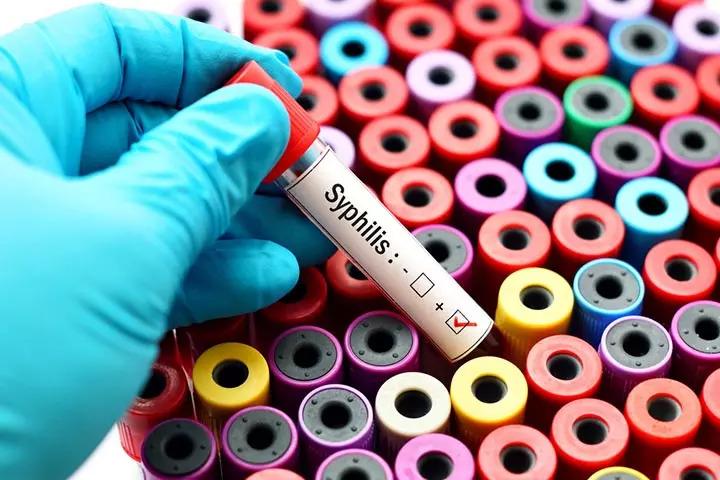Syphilis is a sexually transmitted infection or disease caused by the Treponema pallidum bacterium (1). An unborn baby can contract this infection from their mother during pregnancy or vaginal birth if the mother isn’t treated or treated inadequately for an active infection.
Syphilis in babies, also known as congenital syphilis, is treatable with timely diagnosis and prompt treatment. Leaving the condition untreated may result in adverse effects, such as severe anemia, meningitis, and bone damage. The infection is preventable if the mother takes adequate precautions to avoid the infection during pregnancy.
This post discusses the symptoms, diagnosis, treatment, and prevention of congenital syphilis.
Signs And Symptoms Of Syphilis In Babies
A baby with syphilis infection can show symptoms as early as three to fourteen weeks (early congenital syphilis) or as late as five years (late congenital syphilis). In some cases, late congenital syphilis symptoms may not appear until adulthood (2) (3).
Early congenital syphilis symptoms
- Inflammation of the umbilical cord
- Low birth weight
- Skin irritation and cracking around the mouth and genitals
- Skin rashes starting as blisters, especially on the palms and soles
- Inflammation of the nasal mucous membrane (rhinitis) with watery nasal discharge
- Fever
- Enlarged liver or spleen or both
- Meningitis
- Jaundice
- Severe anemia
- Bone abnormalities
Late congenital syphilis symptoms
- Clouding of the eyeball (cornea)
- Gray, mucus-like patches around the anus and vagina
- Abnormal, peg-shaped teeth (Hutchinson’s teeth)
- Nose deformity with a flattened nasal bridge (saddle nose)
- Painful, swollen joints, especially in the lower limbs
- Nerve problems causing vision changes and blindness
- Hearing problems or deafness
The severity of these symptoms varies from one baby to another. These symptoms may also occur in other conditions, so consult a doctor for an exact diagnosis.
Diagnosis Of Syphilis In Babies
The doctor will perform the following checks to diagnose congenital syphilis (3) (4).
- Physical examination: The doctor will examine the rashes, sores, or uneven patches. The doctors will look for eye inflammation, vision problems, deformities of the teeth, and deafness to confirm late congenital syphilis.
- Blood tests: A blood test can detect specific antibodies for the syphilis bacteria. In most cases, no further testing may be required. However, if the infection is severe, the doctor may perform a lumbar puncture to determine the extent of the infection.
- Lumbar puncture: Spinal tap or lumbar puncture is the procedure in which a doctor extracts a small quantity of cerebrospinal fluid from the spinal cord. This fluid is then tested for any infection, such as meningitis, that can occur due to syphilis.
- X-rays and ultrasound imaging: X-rays help locate and evaluate bone changes or deformities caused by syphilis. Ultrasound imaging is used to check the effect on organs, such as enlarged liver and spleen.
If the mother were tested positive for syphilis during pregnancy, the doctor would examine and test the placenta and umbilical cord for the bacteria’s presence. The above-mentioned diagnostic steps may be conducted on the newborn even if they are asymptomatic to rule out the spread of infection from the mother to the baby.
Experts recommend that siblings of an infant with confirmed syphilis infection must also undergo testing for syphilis.
Treatment For Congenital Syphilis
The antibiotic penicillin is the first-line treatment for syphilis infection in babies. The baby may receive penicillin through an injection or intravenous therapy. If the baby is suspected of having a penicillin allergy, the doctor may recommend another antibiotic or penicillin desensitization. The baby may get penicillin injection directly or intravenously.
If the baby has additional health conditions due to syphilis, such as organ inflammation, parallel treatment will help manage or treat the conditions. The doctor will periodically evaluate the infant to check the response to the treatment.
The treatment must be prompt to avert lasting complications, such as blindness, deafness, facial deformity, and severe neurocognitive problems that affect the baby’s growth.
Tips To Prevent Syphilis In Babies
A mother can protect herself and her baby from the infection by following some precautionary steps.
- Follow safe sexual practices, such as avoiding unprotected sexual activity, especially if you are not in a mutually monogamous relationship. Using barriers, such as male and female condoms, can significantly reduce the risk of transmission. Do note it may not prevent spread through syphilis sores present on other parts of the body.
- Diligently follow your prenatal checkups, even if you don’t have any health issues. At prenatal checks, the doctor discusses the risk factors for syphilis and other infections. If you show symptoms, further tests and treatment could be conducted.
- Prevent reinfection by staying alert to your partner’s syphilis risk. If you feel your partner might have syphilis, encourage them to get tested and treated promptly. If your partner tests positive, avoid sexual contact until they are cured.
Syphilis is a highly contagious infection, and babies can acquire it from their mothers during pregnancy or vaginal birth. The condition is treatable and has minimal complications when diagnosed and treated early. Following safe sexual practices is the best way to keep you and your baby safe.

